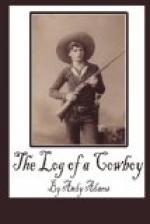Trailing by moonlight was a novelty to all of us, and in the stillness of those splendid July nights we could hear the point men chatting across the lead in front, while well in the rear, the rattling of our heavily loaded wagon and the whistling of the horse wrangler to his charges reached our ears. The swing men were scattered so far apart there was no chance for conversation amongst us, but every once in a while a song would be started, and as it surged up and down the line, every voice, good, bad, and indifferent, joined in. Singing is supposed to have a soothing effect on cattle, though I will vouch for the fact that none of our Circle Dots stopped that night to listen to our vocal efforts. The herd was traveling so nicely that our foreman hardly noticed the passing hours, but along about midnight the singing ceased, and we were nodding in our saddles and wondering if they in the lead were never going to throw off the trail, when a great wig-wagging occurred in front, and presently we overtook The Rebel, holding the lantern and turning the herd out of the trail. It was then after midnight, and within another half hour we had the cattle bedded down within a few hundred yards of the trail. One-hour guards was the order of the night, and as soon as our wagon and saddle horses came up, we stretched ropes and caught out our night horses. These we either tied to the wagon wheels or picketed near at hand, and then we sought our blankets for a few hours’ sleep. It was half past three in the morning when our guard was called, and before the hour passed, the first signs of day were visible in the east. But even before our watch had ended, Flood and the last guard came to our relief, and we pushed the sleeping cattle off the bed ground and started them grazing forward.
Cattle will not graze freely in a heavy dew or too early in the morning, and before the sun was high enough to dry the grass, we had put several miles behind us. When the sun was about an hour high, the remainder of the outfit overtook us, and shortly afterward the wagon and saddle horses passed on up the trail, from which it was evident that “breakfast would be served in the dining car ahead,” as the traveled Priest aptly put it. After the sun was well up, the cattle grazed freely for several hours; but when we sighted the remuda and our commissary some two miles in our lead, Flood ordered the herd lined up for a count. The Rebel was always a reliable counter, and he and the foreman now rode forward and selected the crossing of a dry wash for the counting. On receiving their signal to come on, we allowed the herd to graze slowly forward, but gradually pointed them into an immense “V,” and as the point of the herd crossed the dry arroyo, we compelled them to pass in a narrow file between the two counters, when they again spread out fan-like and continued their feeding.




